 Petzlover
Petzlover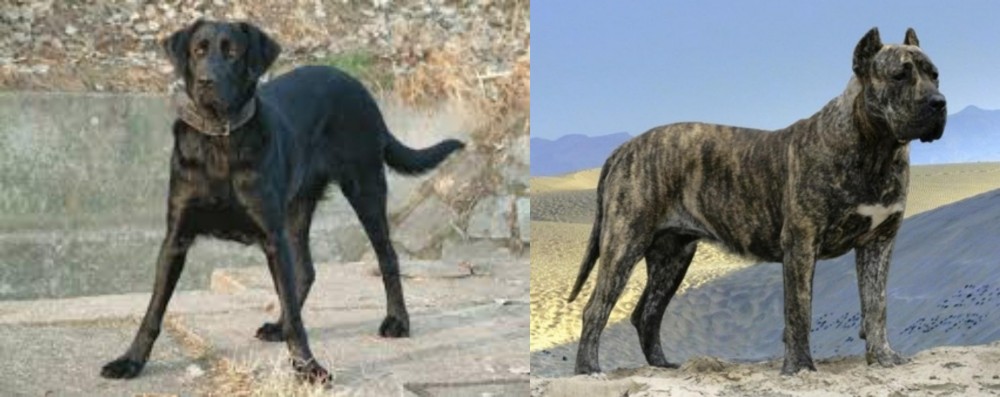 Cao de Castro Laboreiro is originated from Portugal but Presa Canario is originated from Spain. Both Cao de Castro Laboreiro and Presa Canario are having almost same height. Cao de Castro Laboreiro may weigh 10 kg / 23 pounds more than Presa Canario. Both Cao de Castro Laboreiro and Presa Canario has almost same life span. Both Cao de Castro Laboreiro and Presa Canario has almost same litter size. Both Cao de Castro Laboreiro and Presa Canario requires Low Maintenance.
Cao de Castro Laboreiro is originated from Portugal but Presa Canario is originated from Spain. Both Cao de Castro Laboreiro and Presa Canario are having almost same height. Cao de Castro Laboreiro may weigh 10 kg / 23 pounds more than Presa Canario. Both Cao de Castro Laboreiro and Presa Canario has almost same life span. Both Cao de Castro Laboreiro and Presa Canario has almost same litter size. Both Cao de Castro Laboreiro and Presa Canario requires Low Maintenance.
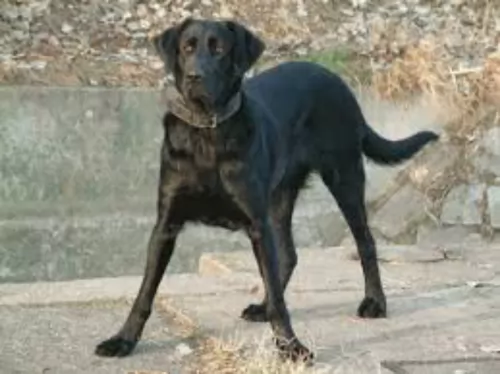 Cão de Castro Laboreiro originates from Portugal. Also known as the Portuguese Cattle Dog he was used long ago to guard livestock. Today, the modern Cao de Castro Laboreiro is descended from the molosser type dog.
Cão de Castro Laboreiro originates from Portugal. Also known as the Portuguese Cattle Dog he was used long ago to guard livestock. Today, the modern Cao de Castro Laboreiro is descended from the molosser type dog.
There are hints to the dog's origins from the 19th century, but changes in agricultural methods meant a disappearance of the dog as a livestock protector. Today the dog is mostly kept as a pet and was first seen at a dog show in 1914.
The Cão de Castro Laboreiro is recognized by the Fédération Cynologique Internationale as well as being recognized by the United Kennel Club in the United States.It is a rare dog and not many exist today but in Portugal, the USA and United Kingdom you will find a few breeders.
 Known also as the Canary Mastiff, the Presa Canario hails from the Canary Islands. He was originally bred for guarding livestock.
Known also as the Canary Mastiff, the Presa Canario hails from the Canary Islands. He was originally bred for guarding livestock.
This isn’t a new breed by any means, and it is believed that the dog dates back to the 15th and 16th centuries. The roots of the dog can be traced back to the Iberian Presa, a medium sized mastiff breed. A number of other Hispanic breeds have contributed to the formation of the Presa Canario, such as the Presa Espanol.
Its numbers have dropped over the years, but in the 1970s, reputable breeders bred Presa Canarios, a courageous, territorial dog.
Because of its aggressive tendencies, the dog has been banned from quite a few countries. It is found in the USA but not recognized by the American Kennel Club.
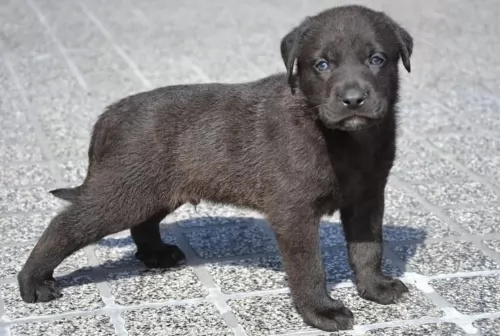 The Cão de Castro Laboreiro is a large dog, with height being in the region of 55 to 60cm and weight being in the region of 45 - 70kg. People describe the dog as wolf-like with a coat that is fairly short, thick and course. The coat is brindle with a base color of shades of grey, chestnut and black.
The Cão de Castro Laboreiro is a large dog, with height being in the region of 55 to 60cm and weight being in the region of 45 - 70kg. People describe the dog as wolf-like with a coat that is fairly short, thick and course. The coat is brindle with a base color of shades of grey, chestnut and black.
This large mastiff-type dog always has a black nose, his tail is long and carried high, but never curling over the back. He has a broad head and is much like the Labrador in looks, being free of wrinkles on the face.The ears of the Cao de Castro Laboreiro are medium-in-size and floppy while the eyes are dark brown.
The Cao de Castro Laboreiro makes an excellent pet as he forms strong bonds with his human family. He is territorial and makes an exceptional guard dog. He doesn’t particularly like strangers and is aloof around them.
This is an intelligent dog breed, he is strong-willed and stubborn, but when he is around the children in the family he is gentle and loving. When he has been trained and socialized, which is always highly recommended with every dog, he gets along with other pets in the home too.
 The Presa Canario is a large Molosser-type dog breed originally bred for working livestock.He stands at between 56 to 65cm in height and weighs between 38 and 60kg. He has a thick, muscular body with a black mask over the broad head.
The Presa Canario is a large Molosser-type dog breed originally bred for working livestock.He stands at between 56 to 65cm in height and weighs between 38 and 60kg. He has a thick, muscular body with a black mask over the broad head.
The ears were always cropped which just added to his aggressive appearance. When left they are high set and floppy, being of medium length. The coat is short and coarse and he is a low shedder. The coat comes in colors such as fawn, tan, or brindle.
Strong willed, confident and determined, the Presa Canario may well have an intimidating look.He looks both powerful and even a bit aggressive, but with training and socialization, the highly intelligent Presa Canario is actually a calm, docile dog, totally loyal and loving with his human family.
These dogs are suspicious of strangers and this makes them excellent watchdogs. For new dog owners, the Presa Canario isn’t a good first choice as he is strong-willed and can be aggressive when in the wrong hands. There are however, always exceptions, but he isn't considered to be a good choice of dog when there are children in the home.
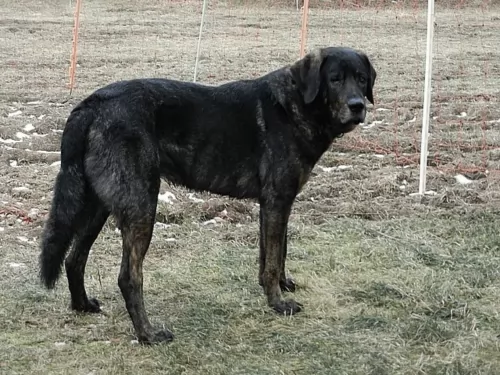 Environment and upbringing have plenty to do with how a dog turns out. People who just buy a dog for guardian purposes and nothing else can’t expect companionship in return.
Environment and upbringing have plenty to do with how a dog turns out. People who just buy a dog for guardian purposes and nothing else can’t expect companionship in return.
The Cão de Castro Laboreiro has always been a fearless guardian of livestock with his strong protective characteristics. He is intelligent and recognizes that a child in the family needs his protection.
This is a large dog who is strong, brave and intelligent but with his human family he is gentle, loving and loyal. Nonetheless he still requires a firm owner, and if you’re fair and firm with him you get the best with him. With this dog you can form a close friendship and bond.
 The Presa Canario is a formidable looking dog and has received quite a lot of negative media attention for being aggressive and dangerous. And yet non-aggressive owners who have brought the dog up properly tell of how well mannered and calm their dogs are.
The Presa Canario is a formidable looking dog and has received quite a lot of negative media attention for being aggressive and dangerous. And yet non-aggressive owners who have brought the dog up properly tell of how well mannered and calm their dogs are.
The dog is confident and powerful and can be loyal and loving while also being well adjusted. Just like children are the fruit of their parents upbringing, so dogs turn out much the same as the kind of owners that reared them, and in the right hands, this big dog can be loyal quiet, loving and trustworthy.
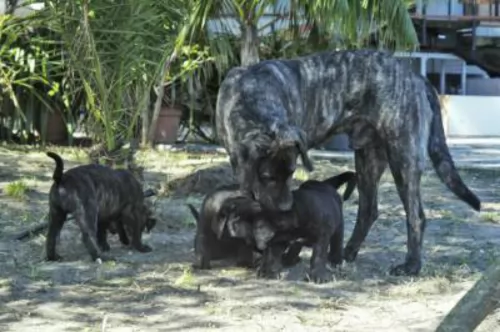 The Cão de Castro Laboreiro is generally a healthy breed, but even so, it is good to be aware of typical canine diseases that your pet may develop.
The Cão de Castro Laboreiro is generally a healthy breed, but even so, it is good to be aware of typical canine diseases that your pet may develop.
There are many eye problems that dogs have to contend with and if you see any kind of ulceration in your dogs eye, get veterinary advice.
A dog should always have access to a shady spot. Never ever leave your dog in a hot car. Heat builds up quickly and death can result soon as the body temperature rises.
Roundworm and tapeworm can infest dogs and you’ll need to speak to your vet about a worming program. Lice, mites and ticks are all parasites which attach themselves to the skin.
 These are large dogs so they are susceptible to hip- or joint dysplasia and canine leishmaniasis.
These are large dogs so they are susceptible to hip- or joint dysplasia and canine leishmaniasis.
This is a skeletal condition, found more often in large dogs. The ball and socket don’t fit properly, grinding as opposed to sliding smoothly. This eventually leads to loss of function of the joint.
There are a few factors that lead to the development of hip dysplasia in dogs, but it is also hereditary. That is why it is so important to provide your dog with the correct nutrition – one that is specially formulated for large breeds.
This is a deadly disease caused by a protozoan parasite found in dogs, mostly in rural areas, and in quite a few areas of the world.
The parasite is transmitted by a sand fly. The clinical signs of dogs with this disease include weakness, fever, swollen lymph nodes, anorexia, weight loss and diarrhea with blood in the stools.
Treatment will require the administration of a special drug. Prognosis for a pet diagnosed with Leishmaniasis is unfortunately not very hopeful.
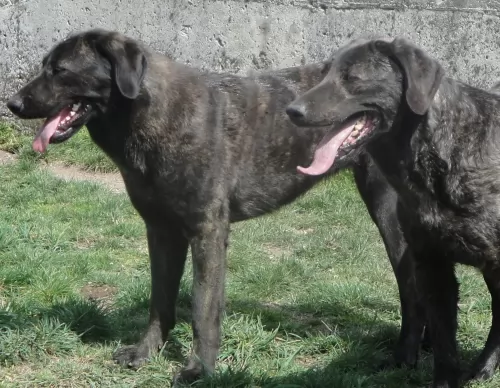 The Cao de Castro Laboreiro has a short coat which requires minimal grooming. Brushing him twice a week to rid him of loose hairs will suffice.
The Cao de Castro Laboreiro has a short coat which requires minimal grooming. Brushing him twice a week to rid him of loose hairs will suffice.
Nail clipping as well as ear- and teeth cleaning are other routine maintenance procedures for your pet.
The food you give your pet must be well-balanced and have protein and carbohydrates. If you want his skin and hair to remain healthy, vitamins, fatty acids and minerals will also be needed.
Boneless chicken and fish, brown rice and vegetables can be a good choice as well as some of the top quality commercially manufactured foods. An active dog will always need a higher protein content and therefore including raw meat into the diet is imperative – not every day as it can be very expensive, but every other day.
Remember that bones can be dangerous as they can splinter and cause your pet internal damage. Fresh, cool water must be available at all times.
 The Presa Canario will require being brushed twice a week to rid him of loose hair although he isn’t a heavy shedder.
The Presa Canario will require being brushed twice a week to rid him of loose hair although he isn’t a heavy shedder.
Keep his nails trimmed.
Check inside his ears for signs of redness and the possibility of an ear infection.
When you brush him, check him over for any unusual lumps.
Make sure the dog is neutered or spayed if you don’t want puppies.
Get your vet to the vet if he shows signs of illness.
Make sure his vaccines are up to date to prevent some deadly canine diseases.
Ensure he has a nice comfortable, dry, warm place to sleep.
Ensure he has a top quality diet to enhance longevity and health. Commercially manufactured dog foods are a convenient means to feed your pet, and there are some excellent brands. Avoid the ones with low quality ingredients that don’t have the right balances of vitamins and minerals.
High quality dry kibble can become exciting when you add in some home-made food. Dogs thrive on simplicity, so boiled chicken, sweet potatoes, brown rice or pasta, carrots and spinach will be 100% sufficient for him. Chop this food up and add it into the dry kibble twice a week as a tasty treat.
Also, your pet will thrive on a bit of raw meat added in from time to time. Make sure he is never without a constant supply of fresh, cool water.
Make sure that your large pet gets a good quota of daily exercise outdoors. Lots of hectic ball- and rope games will keep him happy and keep him slim. Take him for a walk every day.